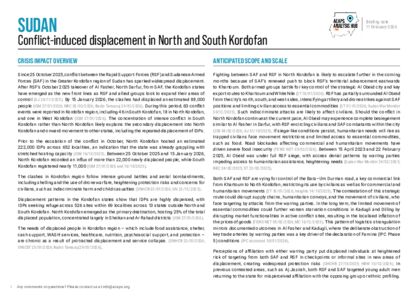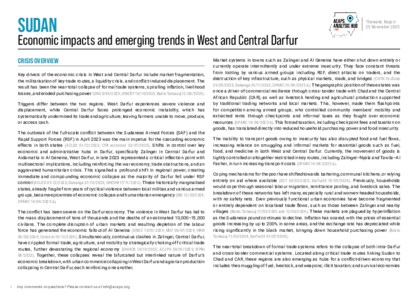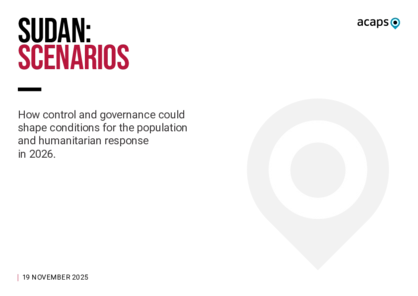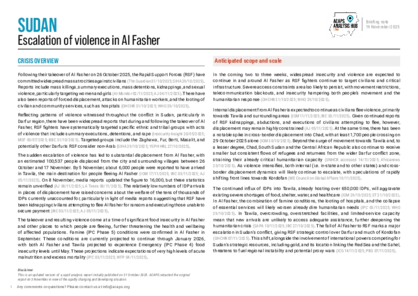Latest updates on country situation
23 February 2026
On 18 February 2026, a drone strike hit a water collection point in Umm Rusum village, As Sunut locality, West Kordofan, killing at least 18 people, including children. The incident highlights continued risks to civilians accessing essential services, while damage to water access points may further constrain safe water availability and increase humanitarian needs. (STC 20/02/2025)
03 February 2026
By 29 January 2026, escalating violence in Darfur had newly displaced over 22,600 people, nearly two-thirds of them children, from Al Fasher and surrounding areas towards remote parts of South Darfur, including Jabal Marra. There has also been a sharp rise in the number of unaccompanied and separated children, overcrowded shelters, limited health access, and measles transmission, signalling worsening protection and health risks. (WVI 29/01/2025)
27 January 2026
Nearly eight million children in Sudan, almost half of the country’s school-aged population, have missed around 500 days of learning since the war began in April 2023. This marks one of the longest education disruptions in Sudan, longer than school closures during the COVID-19 pandemic. Unlike then, conflict, displacement, and infrastructure collapse have also largely suspended remote learning. The education crisis is most acute in North Darfur, where only 3% of schools remain open, followed by West Kordofan (15%), South Darfur (13%), and West Darfur (27%). Many schools have been damaged or repurposed as displacement shelters, while unpaid teachers are increasingly abandoning their posts. Prolonged school closures are heightening child protection risks, including child labour, early marriage, recruitment by armed groups, and sexual violence. With education systems nearing collapse in several regions, the loss of learning is becoming a long-term humanitarian and recovery challenge, not only an emergency education gap. (STC 22/01/2026)
13 January 2026
1,000 days since starting on 15 April 2023, the war between the Sudanese Armed Forces and Rapid Support Forces has triggered the world’s largest displacement crisis, with 13.6 million people uprooted, 9.3 million internally displaced, and four million seeking refuge across borders. Recent mass movements from Al Fasher in North Darfur and parts of Kordofan illustrate continuing insecurity and rapid displacement trends. Civilian casualties are severe, with tens of thousands reported killed and widespread grave violations against children. Health and basic services have collapsed, with 37% of health facilities nonfunctional, going over 70% in some areas. Repeated attacks on medical and humanitarian services, sieges, and explosive hazards continue to restrict assistance. Disease outbreaks (cholera, dengue, malaria, and measles), combined with hunger and disrupted education, have created a multilayered emergency affecting 33.7 million people, including 17.3 million children, many out of school and at acute protection risk. (Insecurity Insight 12/01/2026, Protection Cluster 13/01/2025, WVI 09/01/2025, UNICEF 09/01/2025, WHO 09/01/2025)
09 December 2025
Drone strikes on 4 December 2025 hit multiple sites across South and North Kordofan, including a kindergarten in Kalogi, killing 96 people, including 43 children. Additional strikes hit a hospital treating the wounded and a food convoy, causing further casualties. Needs include trauma care, protection, and safe shelter. (PI 08/12/2025, AJ 07/12/2025)
04 November 2025
Famine (IPC Phase 5) is expected to persist in Al Fasher in North Darfur and Kadugli in South Kordofan from October 2025 to January 2026, according to the latest IPC analysis. Both areas have faced months of restricted humanitarian access, disrupted trade routes, and widespread market collapse. In Al Fasher, violence and repeated drone strikes trap hundreds of thousands of civilians, while in Kadugli, prolonged isolation has depleted food stocks and cut off supply lines. Nationally, 21.2 million people face Crisis (IPC Phase 3) or worse food insecurity, including more than 375,000 in Catastrophe (IPC Phase 5). The analysis highlights extensive livelihood disruption, high food prices, and limited humanitarian reach as key drivers. Malnutrition rates continue to rise sharply among children and pregnant or lactating women. The declaration underscores how prolonged sieges, economic deterioration, and conflict-driven displacement have eroded coping capacities, pushing entire urban populations towards starvation. (IPC 03/11/2025, AP 03/11/2025)
21 October 2025
Between 15–19 October 2025, at least 1,500 people fled Al Fasher town, North Darfur state, because of intensified fighting between the Sudanese Armed Forces and the Rapid Support Forces. Many among the displaced have moved towards Tawila town, where humanitarian conditions remain dire. The situation in and around Al Fasher remains volatile, raising concerns of worsening displacement and aid access. (IOM 20/10/2025, AA 20/10/2025)
current crises
in
Sudan
These crises have been identified through the INFORM Severity Index, a tool for measuring and comparing the severity of humanitarian crises globally.
SDN001 - Complex crisis
Last updated 31/01/2026
Drivers
International Displacement
Conflict/ Violence
Political/economic crisis
Crisis level
Country
Severity level
4.7 Very High
Access constraints
5.0
Analysis products
on
Sudan
11 February 2026
Sudan: Conflict-induced displacement in North and South Kordofan
DOCUMENT / PDF / 300 KB
Since 25 October 2025, conflict between the Rapid Support Forces (RSF) and Sudanese Armed Forces (SAF) in the Greater Kordofan region of Sudan has sparked widespread displacement. After RSF’s October 2025 takeover of Al Fasher, North Darfur, from SAF, the Kordofan states have emerged as the new front lines as RSF and allied groups look to expand their areas of control.
15 December 2025
Sudan: digital harms in conflict zones
DOCUMENT / PDF / 179 KB
This report provides an overview of the types of digital threats and harms reported publicly in Sudan, highlighting the impacts on civilians and humanitarian responders. The report stresses the critical importance of understanding these harms – including weaponised disinformation, connectivity blackouts, and surveillance – because of their very real and profound offline consequences and offers concrete, illustrative examples from the Sudanese context.
25 November 2025
Sudan: economic impacts and emerging trends in West and Central Darfur
DOCUMENT / PDF / 580 KB
This analysis focuses on West and Central Darfur as the dynamics of economic collapse are more acute and severe in these states than in other parts of the region. The report fills a critical gap by providing a targeted and in-depth examination of the specific economic impacts in these areas, including the neartotal breakdown of formal intra-Darfur and cross-border commercial systems.
19 November 2025
Sudan: scenarios (2026)
DOCUMENT / PDF / 1 MB
This report outlinines four scenarios that explore the ways governance and control in Sudan could develop until December 2026 and the potential impacts on people and the humanitarian response. The scenarios consider impacts on the economy, services, access, and humanitarian conditions.
19 November 2025
Sudan: escalation of violence in Al Fasher
DOCUMENT / PDF / 403 KB
Following their takeover of Al Fasher on 26 October 2025, the Rapid Support Forces (RSF) have committed widespread mass atrocities against civilians. Reports include mass killings, summary executions, mass detentions, kidnappings, and sexual violence, particularly targeting women and girls.






